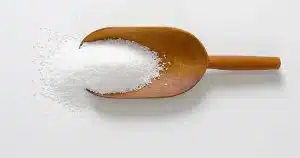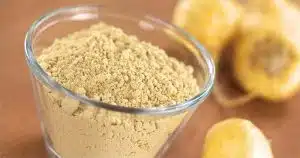Supplements are an important part of your PCOS management plan. And one of the more common supplements is Berberine. If you have been thinking about starting berberine for PCOS, look no further.
Before we get on to how Berberine can help with your PCOS symptoms, we need to understand what it is…
What is Berberine?

The Chinese have been using it as a herbal medicine for over 3000 years, and it’s been gaining popularity in the Western world as well.
So, what does berberine do?
Berberine has many properties that make it beneficial for health, but the two main ones are its ability to lower blood glucose and its anti-inflammatory effects.
Here are 10 ways berberine can help you manage your PCOS symptoms.
Berberine for PCOS
One of the main problems with PCOS is that there is some irregularities in the insulin signaling pathway. This means that we tend to produce too much insulin which can lead to metabolic disorders, as well as a lot of the unpleasant symptoms of PCOS.
One of the ways that berberine works is to lower insulin and glucose levels which can help to improve a lot of the symptoms of PCOS.
Here are some of the ways that Berberine treatment may help your PCOS:
- Reduces Insulin Resistance
- Lowers Blood Sugar Levels
- Aids in Weight Loss
- Improves Cholesterol Levels
- Regulates Menstrual Cycles
- Reduces Inflammation
- Helps Restore Hormonal Balance
- Improves Fertility
- Helps Combat Depression
- Helps Fight Fatty Liver Disease
- Alleviates some of the Symptoms of Menopause
- Improves Body Composition
- Reduces Insulin Resistance
We know that women with Polycystic Ovary Syndrome are prone to insulin resistance. In fact, it is one of the main causes of a lot of our pesky PCOS symptoms.
Berberine improves insulin sensitivity and has been shown to help lower blood glucose levels. One study showed that after 12 weeks of taking Berberine, women with polycystic ovary syndrome showed improved insulin sensitivity (1).
This is exciting news for those of us with PCOS because it means that we can potentially get our symptoms under control without having to resort to medication.
Lowers Blood Sugar Levels

This leads to high plasma glucose levels, which is not only dangerous in the long run but can also cause PCOS symptoms like metabolic syndrome, fatigue, weight gain, and brain fog.
Berberine has been shown to help lower blood sugar levels by improving insulin sensitivity and increasing glucose uptake – the amount of sugar taken up by cells.
Aids in Weight Loss

One clinical study of 37 people who had been diagnosed with metabolic syndrome showed that 12 weeks of treatment with Berberine resulted in weight loss, improved metabolic characteristics and a lowered body mass index (2).
In fact, this particular study showed that the average body mass index went from 31.5 to 27.4 after 12 weeks of berberine use.
It’s thought that berberine works by reducing fat storage, increasing energy expenditure and improving insulin sensitivity.
So, if you’re looking to lose weight, berberine could be a helpful addition to your PCOS management plan.
Improves Cholesterol Levels

Berberine has been shown to help improve cholesterol levels and lipid metabolism by reducing low density lipoprotein cholesterol or LDL (bad cholesterol) and triglycerides while increasing high density lipoprotein cholesterol or HDL (good cholesterol).
One study showed that berberine was just as effective as the cholesterol-lowering drug simvastatin in reducing LDL levels (3).
Another study showed that berberine improved lipid profiles in women with PCOS. After 8 weeks of treatment, the women had significantly lower levels of triglycerides, total cholesterol, and LDL cholesterol (4).
If you are struggling with high cholesterol levels, berberine may be the novel cholesterol lowering drug you have have been looking for.
Regulates Menstrual Cycles

One study showed that berberine improved ovulation rates in women with PCOS.
In another study, published in the Journal of Clinical Endocrinology, 100 women with PCOS were given either berberine or metformin (a common PCOS medication) for 3 months. The results showed that both treatments improved ovulation rates and menstrual regularity.
But what’s even more exciting is that the women who were treated with berberine had significantly higher levels of sex hormone binding globulin than the women who were treated with metformin (5).
This is important because higher levels of sex hormone binding globulin will help to lower overall testosterone levels (or the free androgen index) and can also help to prevent gestational diabetes when you are pregnant (6).
So, if you’re looking for a natural way to regulate your cycles and reduce testosterone levels, berberine could be a good option.
Reduces Inflammation

Also, inflammation and insulin resistance are closely linked – the more inflamed you are, the more insulin resistant you are likely to be
Berberine has been shown to help reduce inflammation by inhibiting the production of pro-inflammatory cytokines. It also acts as anti-oxidant – something that can help to improve egg quality in women with PCOS.
Helps Restore Hormonal Balance

Berberine has been shown to help restore hormonal balance by reducing androgen levels and increasing progesterone levels.
Also, remember that studies have shown that berberine lowered insulin levels and if we can lower insulin levels, we will see an overall improvement in our PCOS symptoms.
One study showed that berberine was able to significantly lower androgen levels in women with PCOS (7).
Another study showed that, after 3 months of treatment with berberine, the women had significantly higher progesterone levels and a decrease in the luteinizing hormone to follicle stimulating hormone ratio (8).
So, what does this mean for you? If you can address the underlying hormonal imbalance we so often see in polycystic ovary syndrome (PCOS), you should see an improvement in all of your PCOS symptoms, not just one or two.
Improves Fertility

Berberine has been shown to help improve ovulation rates in women with PCOS. Interestingly, it also improved endometrial receptivity. This is basically improving the process of implantation of the embryo.
So, if you’re trying to get pregnant, berberine could be a helpful supplement to take.
Helps Combat Depression

There is a growing body of evidence that shows that berberine treatment can improve both depression and anxiety (9).
Helps Fight Fatty Liver Disease

That is why you may want to consider liver function tests as part of your regular PCOS check up.
The good news is that Berberine has been shown to be an effective treatment for NAFLD. It works by reducing triglyceride levels, improving insulin sensitivity, and reducing inflammation. (11)
Alleviates some of the Symptoms of Menopause

Some of these include:
- Cardiovascular disease
- Type 2 diabetes mellitus and impaired glucose tolerance
- Depression
As you can see from everything we have already spoken about, berberine is an insulin sensitizer and has been shown to have beneficial metabolic effects which can help to combat some of the symptoms seen in menopause (12).
Improves Body Composition

In particular, one study showed a decrease in waist circumference, even if the women involved in the study did not lose weight. This is important as it shows the effect of berberine on visceral fat (fat that surrounds the organs).
So, you can see that Berberine has a whole host of benefits for women with PCOS and it may well be a supplement that you would like to add to your daily supplement regime.
You may also have some more questions about how to use Berberine for PCOS.
Commonly Asked Questions about Berberine for PCOS
How do you use berberine for PCOS?
The recommended dosage of berberine for PCOS is 500mg 2-3 times per day. When looking for a Berberine supplement, look for berberine hydrochloride as it is most bioavailable.
How long does it take for berberine to work?
You should start to see the effects of berberine within 3-6 months.
What is the best time of day to take berberine?
There is no definitive answer to this question as different people may have different schedules. However, it is generally recommended that you take berberine with food.
Can I take berberine if I am trying to get pregnant?
Yes, you can take berberine if you are trying to get pregnant. In fact, it may even help to improve your fertility.
Can I take berberine if I am taking birth control pills?
Yes, you can take berberine if you are taking birth control pills.
What are the side effects of taking berberine?
Studies of berberine have shown little or no serious adverse events. The most common side effect of taking berberine is gastrointestinal upset such as diarrhea, constipation, and nausea. If you experience any of these side effects, you should stop taking berberine and speak to your doctor.
Is berberine safe for long term use?
Yes, berberine is safe for long term use.
Summing it Up
Berberine is a compound that has a whole host of benefits for women with PCOS. As it is a potent insulin sensitizer, It can help to combat insulin resistance, improve fertility, and reduce inflammation. If you are looking for a natural treatment for PCOS, then berberine may be worth considering.
Have you taken berberine for your PCOS? What has your experience been? I’d love to hear from you! Leave me a comment below and let me know!
- sustainable pcos weight loss strategies
- Over 5500 women have done it and seen results
- [bonus] Done for you pcos meal plans
- [bonus] intermittent fasting for pcos course
- [BONUS] personalised nutrition plan
JOIN OVER 5,500 OTHERS
References:
1Mishra, N., Verma, R., & Jadaun, P. (2022, January 31). Cureus | Study on the Effect of Berberine, Myoinositol, and Metformin in Women with Polycystic Ovary Syndrome: A Prospective Randomised Study. Study on the Effect of Berberine, Myoinositol, and Metformin in Women with Polycystic Ovary Syndrome: A Prospective Randomised Study; www.cureus.com. https://www.cureus.com/articles/77796-study-on-the-effect-of-berberine-myoinositol-and-metformin-in-women-with-polycystic-ovary-syndrome-a-prospective-randomised-study
2NIlyas, Z., Perna, S., Al-thawadia, S., & Alalwana, T. (2020, April 27). The effect of Berberine on weight loss in order to prevent obesity: A systematic review. The Effect of Berberine on Weight Loss in Order to Prevent Obesity: A Systematic Review – ScienceDirect; www.sciencedirect.com. https://www.sciencedirect.com/science/article/pii/S0753332220303292
3Zhang, L., Zhang, J., & Feng, R. (2019, January 1). Efficacy and Safety of Berberine Alone or Combined with Statins for the Treatment of Hyperlipidemia: A Systematic Review and Meta-Analysis of Randomized Controlled Clinical Trials – PubMed. PubMed; pubmed.ncbi.nlm.nih.gov. https://pubmed.ncbi.nlm.nih.gov/31094214/
4TRondanelli, M., Riva, A., Petrangolini, G., Allegrini, P., Giacosa, A., Fazia, T., Bernardinelli, L., Gasparri, C., Peroni, G., & Perna, S. (2021, October 19). Nutrients | Free Full-Text | Berberine Phospholipid Is an Effective Insulin Sensitizer and Improves Metabolic and Hormonal Disorders in Women with Polycystic Ovary Syndrome: A One-Group Pretest–Post-Test Explanatory Study | HTML. MDPI; www.mdpi.com. https://www.mdpi.com/2072-6643/13/10/3665/htm
5Baldwin-lien, B. (2014, February 5). Berberine Compared to Metformin in Women with PCOS | Natural Medicine Journal. Berberine Compared to Metformin in Women with PCOS | Natural Medicine Journal; www.naturalmedicinejournal.com. https://www.naturalmedicinejournal.com/journal/berberine-compared-metformin-women-pcos
6Veltman-Verhulst, S. M., Haeften, T. W. van, Eijkemans, M. J. C., Valk, H. W. de, Fauser, B. C. J. M., & Goverde, A. J. (2010, December 1). Sex hormone-binding globulin concentrations before conception as a predictor for gestational diabetes in women with polycystic ovary syndrome | Human Reproduction | Oxford Academic. OUP Academic; academic.oup.com. https://academic.oup.com/humrep/article/25/12/3123/552120
7Zhang, S., Zhou, J., Gober, H., Leung, W., & Wang, L. (2021, March 16). Effect and mechanism of berberine against polycystic ovary syndrome. Effect and Mechanism of Berberine against Polycystic Ovary Syndrome – ScienceDirect; www.sciencedirect.com. https://www.sciencedirect.com/science/article/pii/S0753332221002535
8Xie, L., Zhang, D., Ma, H., & He, H. (2019, December 13). The Effect of Berberine on Reproduction and Metabolism in Women with Polycystic Ovary Syndrome: A Systematic Review and Meta-Analysis of Randomized Control Trials – PubMed. PubMed; pubmed.ncbi.nlm.nih.gov. https://pubmed.ncbi.nlm.nih.gov/31915452/
9Fan, J., Zhang, K., Jin, Y., Li, B., Gao, S., Zhu, J., & Cui, R. (2018, November 18). Pharmacological effects of berberine on mood disorders – PMC. PubMed Central (PMC); www.ncbi.nlm.nih.gov. https://www.ncbi.nlm.nih.gov/pmc/articles/PMC6307759/
10Asfari MM, Sarmini MT, Baidoun F, et alAssociation of non-alcoholic fatty liver disease and polycystic ovarian syndromeBMJ Open Gastroenterology 2020;7:e000352. doi: 10.1136/bmjgast-2019-000352
11Wei, X., Wang, C., Hao, S., Song, H., & Yang, L. (2016, July 3). The Therapeutic Effect of Berberine in the Treatment of Nonalcoholic Fatty Liver Disease: A Meta-Analysis – PMC. PubMed Central (PMC); www.ncbi.nlm.nih.gov. https://www.ncbi.nlm.nih.gov/pmc/articles/PMC4947506
12Caliceti, C., Rizzo, P., & Giuseppe Cicero, A. F. (2015, February 17). Potential Benefits of Berberine in the Management of Perimenopausal Syndrome – PMC. PubMed Central (PMC); www.ncbi.nlm.nih.gov. https://www.ncbi.nlm.nih.gov/pmc/articles/PMC4346702









